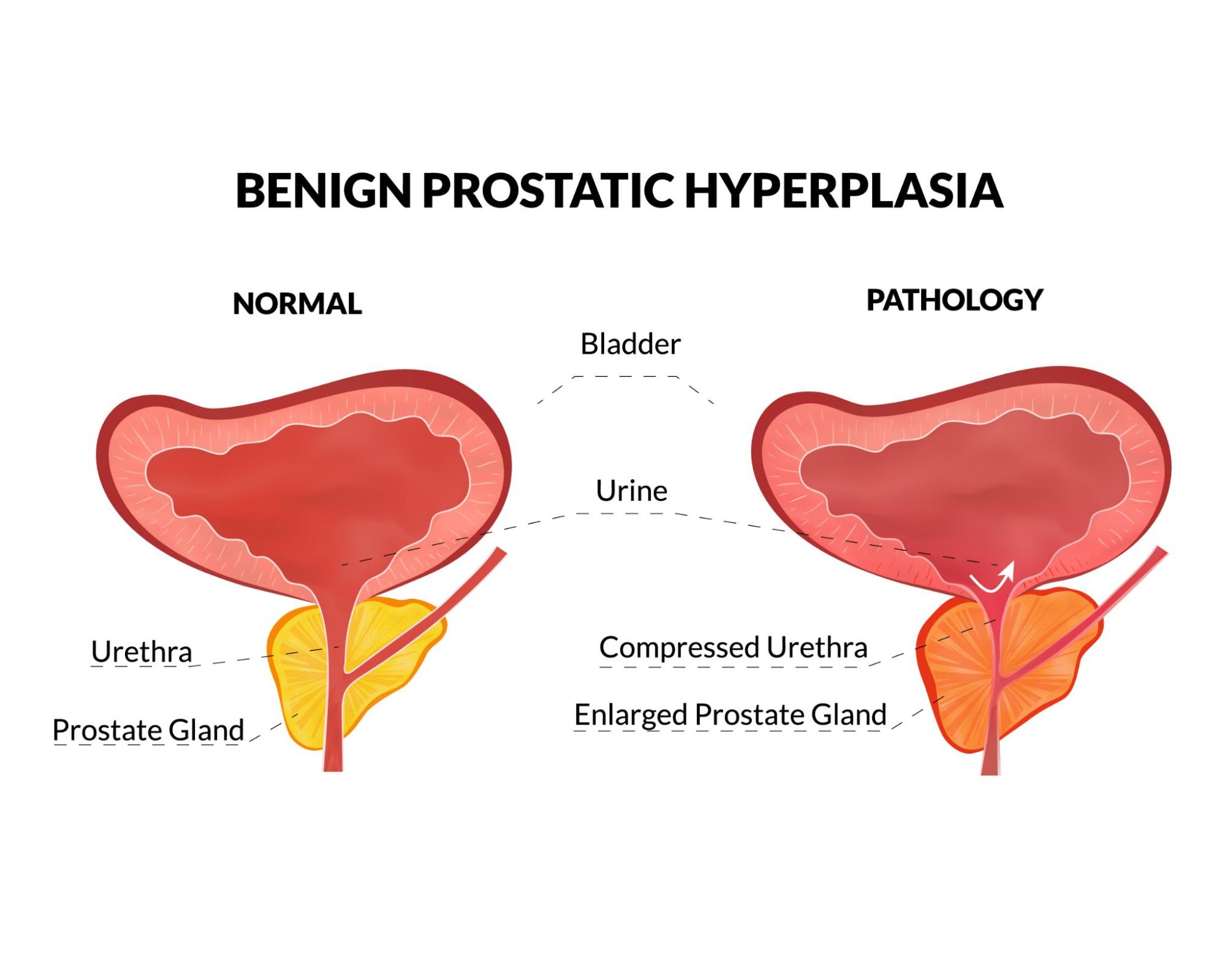Benign Prostatic Hyperplasia / Urology
11 Benign Prostatic Hyperplasia FAQs

by admin
10th January 2020
5 minutes read
Have you been in a situation where you have had pain in your lower abdomen or somewhere below your bladder? Or have you heard of someone you know, has experienced similar pain? Have you not been able to figure out why it is hurting there? And when you asked ‘that friend’ or people around you, have they told you that it is “Enlarged Prostate” or “Benign Prostatic Hyperplasia (BPH)”?
In case you think or you actually have Enlarged Prostate, then you might have some questions running in your mind. Read the following section, where we have tried to answer questions which you may have in your mind.
FAQ 1. What is the main cause of prostate enlargement?
Doctors clearly don’t know what causes prostate enlargement. But, there are some risk factors and they are:
- Age: Men who are 60 years or above have a 33% chance of developing prostate enlargement and half of the men who are 80 years old or above have enlarged prostate. Enlarge prostate cases where men are younger than 40 are rare. So, doctors think that age might be one of the risk factors for BPH.
- Family: If someone in your familiy have or had a history of BPH, then there is a good chance that you may develop prostate enlargement.
- Lifestyle: People who have obesity have a higher risk of BPH and people who regularly exercise have a lower risk of BPH.
- Diabetes and Heart Disease: Studies indicate that those with diabetes, heart disease, users of beta-blockers have a higher risk of BPH.
FAQ 2. Is it dangerous to have an enlarged prostate?
or
FAQ 3. What happens if an enlarged prostate is left untreated?
Doctors consider BPH as a part of men’s aging process. If you get treated for BPH or enlarged prostate, then there is nothing to worry about. But, if you ignore the condition, it may lead to urinary retention. This can act as a precursor to bladder damage or bladder stones, Urinary Tract Infections (UTIs) and also cause damage to kidney.
FAQ 4. What will shrink an enlarged prostate?
If you have BPH, then it is better to consult a doctor. The doctors may suggest medications to shrink your prostate. These medications will prevent hormonal changes which might cause prostate growth. These medications might take up to 6 months to be effective. The other option to treat BPH is surgery.
FAQ 5. Can enlarged prostate be cured?
If you have an enlarged prostate, then you should be looking for treatment options. In that case, you can feel better knowing that there are several treatment options for Benign Prostatic Hyperplasia (BPH). Through these, yes BPH can be cured.
FAQ 6. What is the best treatment for an enlarged prostate?
If you have Enlarged Prostate (BPH), then you should visit your doctor. He/she will see your condition and suggest treatment options. Enlarged Prostate treatment options are medications, surgery and herbal therapies.
If necessary, then doctors will prescribe medications depending on your condition. If you are looking for herbal therapies, then there are no scientific proof that any of the herbal therapies work. The surgical options for BPH include and are not limited to:
- Prostatic Artery Embolization (PAE): It is a minimally invasive treatment that doctors might suggest to lower urinary tract symptoms caused by BPH.
- TUMT (Transurethral Microwave thermotherapy): In this procedure, the surgeon will use microwave to destroy tissues. Doctors might prefer TUMT if the blockage is mild to moderate.
- TUNA (Transurethral Radio Frequency Needle Ablation): TUNA is a procedure where a surgeon destroys prostate tissue to relieve symptoms and improve urine flow.
- TURP (Transurethral resection of the prostate): In TURP, Surgeon removes only those tissues which block the flow of urine. It is the most common surgery for BPH. It is considered to bring the greatest reduction in BPH symptoms.
FAQ 7. Can an enlarged prostate ever shrink?
There is no scientific evidence about prostate shrinking naturally, but if you are opting to get treatment for it then yes, it can shrink. Consult a doctor, he will guide you through the process.
FAQ 8. What can I eat to shrink my prostate?
You can reduce the risk of enlarged prostate by adding food that contains certain vitamins and minerals. The food that you can add to your diet are:
- Sesame Seeds (Zinc)
- Salmon (Omega-3 fatty acids)
- Bell Peppers (Vitamin C)
- Tomatoes (Lycopene)
- Avocados (beta-sitosterol)
- Vegetables
- Tofu
FAQ 9. What is the best natural remedy for an enlarged prostate?
There are herbal products in the market which claim to shrink the prostate. But there is no scientific proof that these products will work. And they are not regulated. So, it is better to consult your doctor for treatment options.
FAQ 10. What food harms the prostate?
If you want to keep your prostate healthy, then you can avoid the following food in your diet.
- Processed and red meat
- Alcohol
- Dairy
- Saturated fat
FAQ 11. Is coffee bad for your prostate?
If you have BPH (Benign Prostatic Hyperplasia or Enlarged Prostate) then you should avoid coffee and caffeine in your diet.
We at Medfin , the Surgery expert team, offer you access to the latest and most advanced treatment for elective surgeries at the most affordable costs. Our Personal Medfin assistants answer all your concerns related to surgery and ensure that your needs are met in your entire medical journey.
To consult an expert Medfin surgeon near you, please call us on 7026200200. You can also WhatsApp us on 7406557599 (click here to initiate a whatsapp chat).
CATEGORIES
- ACL Reconstruction
- Anal Fissures
- Anal Fistula
- Appendicitis
- ASK A DOCTOR
- Benign Prostatic Hyperplasia
- Breast Lump Excision
- Cataract
- Circumcision
- Conditions & Diseases
- Cosmetology
- Covid-19
- Cure
- Endocrinology
- ENGLISH VIDEOS
- Eye Care
- Gallstones
- General Surgeries
- Government Schemes
- Gynaecology
- Gynecomastia
- Gynecomastia
- Health
- Health Insurance
- Hernia
- hindi
- Hip Arthoscopy
- Hip Replacement
- Hip Replacement Surgery
- Hydrocele
- Kannada
- Kidney Stones
- Knee Arthroscopic
- Laparoscopic
- LASER
- Latest Treatments
- Lifestyle
- Liposuction
- Medfin Stories
- Medicine
- Nephrology
- Ophthalmology
- Orthopaedic
- Paraphimosis
- Patient Testimonials
- PCL Reconstruction
- Phimosis
- Piles (Hemorrhoids)
- Pilonidal Sinus
- Proctology
- Prostate Artery Embolization
- Rhinoplasty
- Second Opinion
- Total Knee Replacement
- Uncategorised
- Urology
- uterine artery embolization
- Uterine Fibroids
- Varicocele
- Varicose Veins
- Vascular
- VIDEOS







